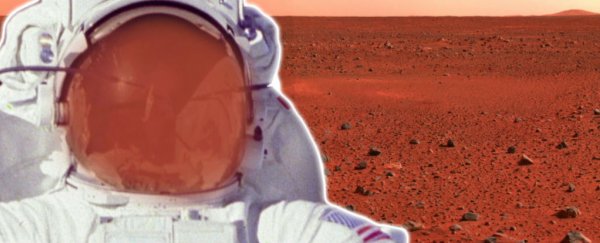For those of you who've seen The Martian already, you'll know it's the story of an astronaut who gets left behind on Mars for an entire year. The horror of knowing you're 226 million kilometres from any other human being would be enough to send you mad on its own, but you've also got a whole lot more to worry about, such as the fact that atmosphere on the red planet is 95.97 percent carbon dioxide, and it's about 80 times thinner than the atmosphere on Earth, which means you're basically living in a vacuum, the latest episode of BrainCraft explains.
If you were exposed to the atmosphere on Mars, devastating loneliness is going to be the least of your troubles because your tears, saliva, the moisture in your skin, and the water in your lungs would all boil away. What a way to die.
Which is why astronaut Watney keeps to his pressurised environment in the film, which delivers clean oxygen and a regulated atmosphere on a planet that's way too harsh for humans on its own. But even if you lock yourself away in a perfectly sealed cabin that mimics the conditions on Earth, you're still likely to experience some really weird things if you attempt to live on Mars, or anywhere else in space.
According to the video above, Buzz Aldrin started seeing things during the Apollo 11 mission in 1969 - strange flashes of light out in the blackness of space. Later experiments revealed that the high-energy charged particles that make up cosmic rays were causing astronauts to perceive bright flashes that weren't really there. You cannot 'see' cosmic rays, no matter how hard you try, so what's going on here?
Known as the cosmic ray visual phenomenon, it occurs when cosmic rays pass through an astronaut's eyes and mess with their optic nerve, which produces an optical illusion. Not only that, but once the astronauts get home, they'll probably have to deal with having worse eyesight than when they left, because all of the increased pressure and fluid shifts in the eye will have likely changed its structure.
But your eyes aren't the only thing you have to worry about when you're as far out as Mars. In experiments, those same cosmic rays have been shown to change the structure of brain cells in mice that had been exposed for six weeks. This had a noticeable affect on their behaviour - mice exposed to cosmic rays were more easily confused, and less likely to explore.
And while mice are not humans, the researchers say that if the same thing could be observed in humans, it could mess with their ability to problem-solve in an environment with a lot of problems.
A whole lot more is awaiting the brave souls that are scheduled to land on Mars some time in mid-2030, but I'll let Vanessa Hill and Physics Girl explain the disconcerting array of health problems, and how astronauts learn to deal with them. Ever noticed that astronauts tend to have a great sense of humour? That's not a coincidence - find out why in the latest episode of BrainCraft above.
